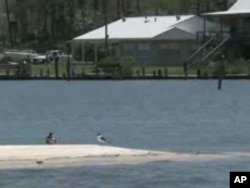As oil from the major spill in the Gulf of Mexico reaches land, scientists are in a race against time.
Just off the Alabama coast, on Dauphin Island, researchers are hurrying to take fishing population samples, train people to help de-oil birds and ask hard questions about the containment operation and its effect on the environment.
Race against time
Young scientists are frantically collecting fish as the oil continues to spread.
They want to get a handle on the size of the fish populations before the damage is done so they can work out later just how the oil spill affects fish stocks in the Gulf of Mexico.
The samples are packed in ice and shipped off to Dauphin Island Sea Lab - a major research facility for marine animals birds and plants.
"People have been scrambling to go out and gather data now, even if it is not on our regular sampling schedule to make sure we have pre-condition information that is really fresh and new and current and that and that we can do the best we can to sort of work as a group and a community to share that information," says Ruth Carmichael, a marine scientist who studies manatees at Sea Lab.
Dauphin Island is home to just over a 1,000 people, but it has more than 350 species of birds. Many of them, like the stately heron, feed on fish and other aquatic life.
Birds at risk
"Just imagine when those birds there are feeding they are diving into the water and so they are going to encounter oil," says John Dindo, Sea Lab's bird expert.
Dindo is preparing for the worst. He says all these birds rely on the sea for their food.
"That is an Osprey, that's a fish hawk. That's a diving bird, dives on fish," he says. "You watch. He'll come up out of water and he will turn into the wind and shake to shed the water."
The oil will make shedding that water very difficult and even a de-oiling effort on this island will have many casualties.
"Even the process of de-oiling birds has a high mortality rate because you are not only going to take off the oil that they encountered in the water but you are taking out their natural oils, and then temperature regulation becomes a very big factor," says Dindo. "So even after you are trying your best to save them, you still have mortality."
Even if the spill doesn't reach land, it affects the ecosystem out in the Gulf. Many larger animals in the water rely on subaquatic vegetation for food. Any measure of the impact will depend on how quickly the flow of oil can be stemmed.
















